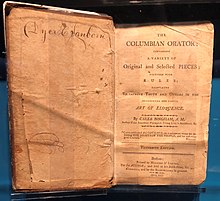The Columbian Orator
Appearance

The Columbian Orator, a collection of political essays, poems, and dialogues first published in 1797, was widely used in American schoolrooms in the first quarter of the 19th century to teach reading and speaking.
Quotes
[edit]- To scatter the clouds of ignorance and error from the atmosphere of reason; to remove the film of prejudice from the mental eye; and thus to irradiate the benighted mind with the cheering beams of truth, is at once the business and the glory of eloquence.
- "Extract from an Oration on Eloquence, Pronounced at Harvard University on Commencement Day, 1794", p. 30
- Slave: What have you done, what can you do for me, that will compensate for the liberty which you have taken away?
- Master: I did not take it away. You were a slave when I fairly purchased you.
- Slave: Did I give my consent to the purchase?
- Master: You had no consent to give. You had already lost the right of disposing of yourself.
- Slave: I had lost the power, but how the right?
- "Dialogue Between a Master and a Slave", p. 240
- Master: It is in the order of Providence that one man should become subservient to another. It ever has been so, and ever will be. I found the custom, and did not make it.
- Slave: You cannot but be sensible, that the robber who puts a pistol to your breast may make just the same plea. Providence gives him a power over your life and property; it gave my enemies a power over my liberty. But it has also given me legs to escape with; and what should prevent me from using them?
- "Dialogue Between a Master and a Slave", p. 241
Quotes about The Columbian Orator
[edit]- The moral which I gained from the dialogue was the power of truth over the conscience of even a slaveholder. What I got from Sheridan was a bold denunciation of slavery, and a powerful vindication of human rights.
- Frederick Douglass, Narrative of the Life of Frederick Douglass, an American Slave

